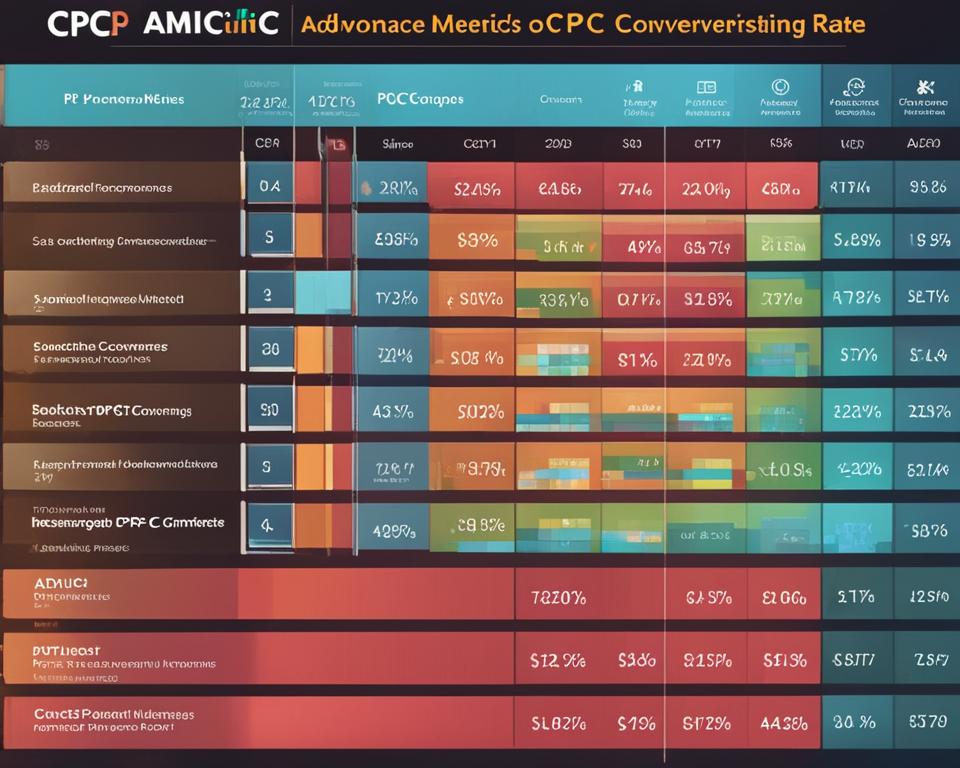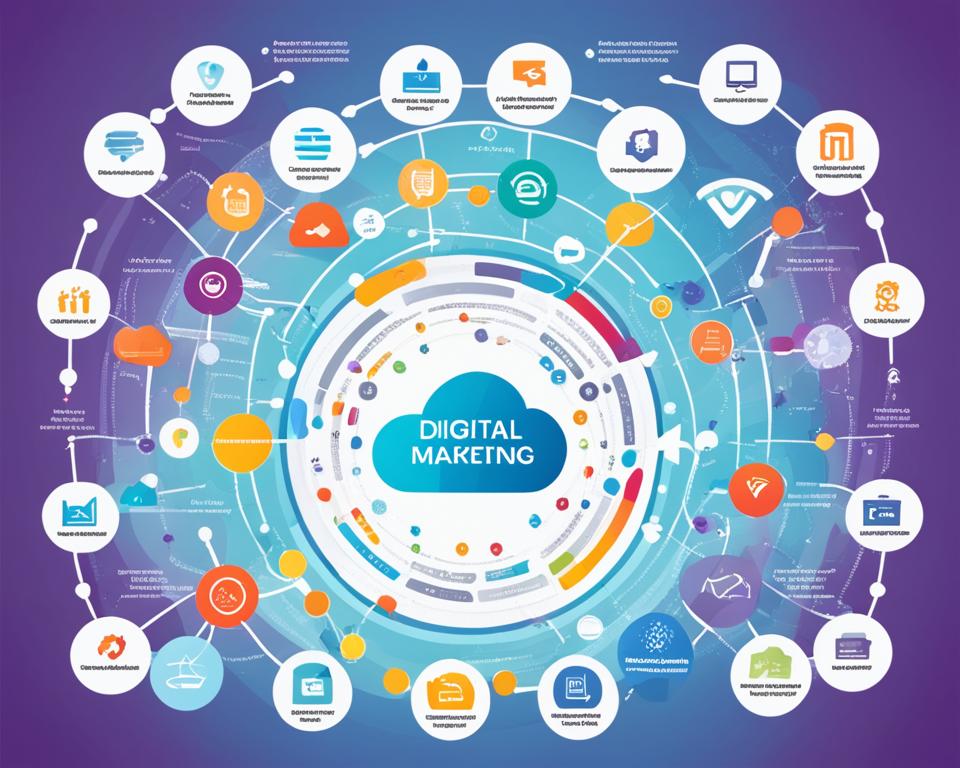Di artikel ini, kami akan memberikan tips berharga untuk memilih platform Digital Marketing yang tepat untuk meningkatkan bisnis Anda di Indonesia. Memilih platform yang sesuai sangat penting untuk mencapai kesuksesan di dunia online.
Understanding Digital Marketing
Before delving into the process of selecting the right platform, it is crucial to grasp the fundamentals of Digital Marketing. With the advent of technology, businesses now have access to various strategies that can maximize their online presence and connect with their target audience. Digital Marketing encompasses a wide range of techniques, including Online Marketing and Internet Marketing, which revolve around promoting products or services through digital channels.
Online Marketing focuses on leveraging online tools and platforms to reach potential customers. It involves utilizing search engines, social media platforms, email marketing, and other digital channels to create brand awareness, drive traffic, and generate leads. By employing effective Online Marketing strategies, businesses can tap into the immense potential of the internet to expand their reach and boost sales.
Internet Marketing, on the other hand, encompasses a broader scope. It involves utilizing various online platforms and channels to promote products or services, including websites, social media platforms, search engines, email marketing, and more. Internet Marketing encompasses both organic (unpaid) and paid methods to drive traffic, generate leads, and increase conversions.
“Digital Marketing encompasses a wide range of techniques, including Online Marketing and Internet Marketing, which revolve around promoting products or services through digital channels.”
Understanding the fundamentals of Digital Marketing is crucial as it provides the necessary knowledge and context for selecting the appropriate platform that aligns with your business goals. By leveraging the power of Online Marketing and Internet Marketing, businesses can effectively navigate the digital landscape and utilize the available tools and channels to achieve remarkable results.
Advantages of Digital Marketing
Digital Marketing offers several advantages over traditional marketing methods. These benefits include:
- Wider reach: With the internet being accessible to a larger audience, Digital Marketing enables businesses to reach a global customer base.
- Targeted audience: Digital Marketing allows businesses to precisely target their desired audience based on factors such as age, location, interests, and more.
- Cost-effective: Compared to traditional marketing methods, Digital Marketing typically requires lower investments and provides a higher return on investment (ROI).
- Real-time analytics: Digital Marketing provides real-time data and analytics, allowing businesses to track and monitor the performance of their campaigns and make necessary adjustments in real-time.
- Improved engagement: Through various digital channels, businesses can interact and engage with their audience in a more personalized and meaningful way.
- Measurable results: With the help of digital tools and analytics, businesses can measure the effectiveness of their marketing efforts and make data-driven decisions to optimize their strategies.
Importance of Search Engine Optimization (SEO)
One crucial aspect of Digital Marketing is Search Engine Optimization (SEO), which focuses on improving a website’s visibility in search engine results. Utilizing SEO techniques, including Search Engine Marketing and Google Ads, can greatly enhance your online presence.
When it comes to promoting your business online, visibility is key. With millions of websites competing for attention, it is essential to optimize your website so that it ranks higher in search engine results pages (SERPs). This is where SEO comes into play.
SEO involves optimizing various factors on your website, such as content, keywords, metadata, and backlinks, to make it more attractive to search engines like Google. By implementing effective SEO strategies, you can improve your website’s chances of appearing on the first page of search results, where the majority of users click.
Search Engine Marketing (SEM) incorporates various techniques to promote websites on search engines. It includes both organic SEO efforts and paid advertising methods, such as Google Ads. Through SEM, businesses can increase their visibility and reach a wider audience.
Google Ads, formerly known as Google AdWords, is a powerful advertising platform that allows you to create highly targeted ads and display them to potential customers when they are searching for products or services related to your business. By leveraging Google Ads, you can drive qualified traffic to your website and increase conversions.
SEO and Search Engine Marketing, including Google Ads, are essential components of a successful Digital Marketing strategy. By investing in SEO practices and utilizing SEM techniques, businesses can improve their online visibility, attract more organic traffic, and drive meaningful results.
The Benefits of SEO and Search Engine Marketing:
- Increased website visibility in search results
- Higher organic traffic and targeted leads
- Better user experience and website performance
- Increase brand credibility and authority
- Cost-effective compared to other marketing channels
- Long-term sustainability for online success
It is important to note that SEO is an ongoing process that requires regular monitoring, analysis, and optimization. Algorithms and search engine guidelines change frequently, so staying up-to-date with the latest SEO trends and best practices is crucial.
Leveraging Social Media Marketing
Social Media Marketing has revolutionized the way businesses connect with their audience. With platforms like Facebook, Instagram, Twitter, and LinkedIn dominating the digital landscape, effective utilization of social media is essential for businesses to thrive in the online realm.
By strategically leveraging Social Media Marketing, businesses can:
- Increase brand awareness: Social media platforms provide a wide-reaching, highly engaging space to showcase your brand’s unique personality and offerings. Sharing compelling content and interacting with your audience helps build brand recognition and loyalty.
- Connect with your target audience: Social media platforms enable direct communication with your target audience, fostering meaningful connections. By understanding your audience’s preferences and interests, you can tailor your messaging and offerings to better meet their needs.
- Drive traffic to your website: Social media platforms serve as valuable channels for directing traffic to your website. By sharing engaging content that prompts users to visit your site, you can generate leads and conversions.
Harnessing the power of Social Media Marketing requires a strategic approach. It’s vital to:
- Identify relevant social media platforms: Research and analyze which platforms are most popular among your target audience. Focus your efforts on those platforms where your audience is most active.
- Create compelling content: Develop a content strategy that aligns with your brand image and resonates with your audience. Engaging visuals, informative articles, and interactive polls or quizzes can drive user engagement and expand your reach.
- Consistently engage with your audience: Building a strong social media presence requires active engagement. Respond to comments and messages promptly, participate in discussions, and interact with followers to foster a sense of community.
- Analyze and measure your results: Regularly monitor the performance of your social media campaigns. Track key metrics such as reach, engagement, and conversions to identify areas for improvement and refine your strategy.
To illustrate the impact of Social Media Marketing, consider the following statistics:
| Social Media Platform | Number of Monthly Active Users (Millions) |
|---|---|
| 2900 | |
| 1600 | |
| 330 | |
| 310 |

Utilizing the power of social media platforms is no longer an option but a necessity for businesses seeking growth and success in the digital age. By implementing a well-planned Social Media Marketing strategy, businesses can effectively connect with their target audience, increase brand visibility, and drive traffic to their websites.
Harnessing the Power of Content Marketing
Content Marketing plays a vital role in establishing your business as an industry expert and driving organic traffic to your website. By creating and distributing valuable content, you can attract and engage a specific audience, building trust and credibility in the process.
Implementing a solid content marketing strategy requires careful planning and execution. It involves identifying your target audience’s needs and preferences, and creating content that addresses their pain points and provides valuable solutions. Whether it’s informative blog posts, engaging videos, or interactive infographics, the key is to deliver content that resonates with your audience and adds value to their lives.
Through strategic distribution channels, such as social media platforms, newsletters, and guest blogging, you can amplify the reach of your content and attract more potential customers to your website. By consistently delivering high-quality content, you can position your brand as a thought leader in your industry, which fosters trust, credibility, and loyalty among your audience.
“Content marketing is a strategic approach that focuses on creating and distributing valuable, relevant, and consistent content to attract and retain a clearly defined audience – and, ultimately, to drive profitable customer action.” – Content Marketing Institute
Incorporating search engine optimization (SEO) techniques into your content marketing strategy can further enhance its effectiveness. By optimizing your content with relevant keywords, meta tags, and headers, you can improve its visibility on search engine result pages, attracting more organic traffic to your website.
When developing your content marketing strategy, it’s important to understand your audience’s preferences and tailor your content accordingly. Conducting thorough market research and utilizing analytics tools can provide valuable insights into your audience’s interests, preferences, and online behavior. This information can help you create content that resonates with your audience and drives meaningful engagement.
Benefits of Content Marketing
Content marketing offers numerous benefits for businesses, including:
- Building brand awareness and loyalty
- Establishing credibility and thought leadership
- Boosting website traffic and search engine rankings
- Generating high-quality leads and conversions
- Nurturing customer relationships and loyalty
- Driving long-term business growth and profitability
By harnessing the power of content marketing, you can position your business for success in the competitive online landscape, connect with your target audience, and drive meaningful results.
| Content Marketing Statistics | |
|---|---|
| Content marketing generates 3 times more leads than traditional marketing methods. | |
| 70% of consumers prefer to learn about a company through articles rather than advertisements. | |
| Content marketing costs 62% less than traditional marketing and generates about 3 times as many leads. | |
| 60% of marketers create at least one piece of content each day. |
With the right content marketing strategy in place, you can effectively engage your target audience, establish your brand as a trusted authority, and drive sustainable growth for your business.
Exploring Pay-Per-Click (PPC) Advertising
When it comes to driving targeted traffic to your website, Pay-Per-Click (PPC) advertising is a powerful tool in the world of Digital Marketing. By utilizing PPC, businesses have the opportunity to display ads on search engines or other websites and only pay when users click on the ads. This advertising model, often associated with Search Engine Marketing and Google Ads, allows you to effectively reach your target audience.
PPC advertising works by bidding on keywords related to your business or industry. When users search for those keywords on search engines like Google, your ads have the potential to appear at the top of the search results. This visibility offers an excellent opportunity to attract qualified leads and convert them into customers.
One of the main advantages of PPC advertising is its flexibility. You have control over various aspects of your campaigns, including budget, ad messaging, and target audience. This level of control allows you to optimize your campaigns based on real-time data and make adjustments as needed to maximize your results.
Furthermore, PPC advertising provides you with valuable insights into consumer behavior and preferences. By analyzing the performance of your ads, you can gain a deeper understanding of what resonates with your target audience, helping you refine your marketing strategies and improve overall campaign effectiveness.
Benefits of PPC Advertising:
- Immediate visibility for your business
- Control over budget and ad spend
- Precise targeting of your audience
- Measurable results and data-driven optimization
Overall, Pay-Per-Click (PPC) advertising is an essential component of a well-rounded Digital Marketing strategy. By incorporating PPC into your marketing efforts, you can effectively reach your target audience, drive qualified traffic to your website, and ultimately boost your business’s online success.

Utilizing Email Marketing for Business Growth
Email Marketing remains a powerful tool for businesses to connect with their audience directly. In today’s digital landscape, where communication is primarily conducted through various online channels, email continues to be a reliable method to reach and engage potential customers. By leveraging email campaigns efficiently, you can nurture leads, build customer loyalty, and ultimately generate sales for your business.
Email Marketing allows you to deliver personalized messages and tailored offers directly to your subscribers’ inbox. This targeted approach ensures that your content is reaching the right audience, increasing the chances of conversion and customer satisfaction. It’s an opportunity to showcase your brand personality, promote new products or services, and stay top-of-mind with your customers.
When working on your Email Marketing strategy, it’s crucial to consider several factors. Firstly, focus on building a responsive email list with quality leads. This involves capturing leads through opt-in forms on your website or landing pages and providing valuable content in exchange for their contact information. Building an engaged and interested subscriber base lays the foundation for successful Email Marketing campaigns.
Next, ensure your email content is visually appealing, compelling, and well-structured. Use clear and concise language that conveys your message effectively. Incorporate eye-catching visuals, such as product images or relevant graphics, to capture attention and drive engagement. Don’t forget to optimize your emails for mobile devices as more and more people access their emails through smartphones and tablets.
Segmentation is another crucial aspect of Email Marketing. By categorizing your subscribers based on their interests, preferences, or purchase history, you can send targeted emails that resonate with each segment. Personalizing your emails to address specific needs or pain points can significantly improve open rates, click-through rates, and ultimately conversion rates.
Tracking and analyzing the performance of your email campaigns is equally important. Utilize email marketing tools that provide robust analytics, allowing you to measure key metrics such as open rates, click-through rates, and conversion rates. Analyzing these metrics helps you understand the effectiveness of your campaigns, identify areas for improvement, and make data-driven decisions for future iterations.
Moreover, Email Marketing offers opportunities for automation. Implementing automated email sequences such as welcome emails, abandoned cart reminders, or birthday promotions can significantly streamline your marketing efforts and deliver personalized experiences to your subscribers.
In conclusion, Email Marketing remains a valuable strategy for businesses looking to grow and engage their audience. By leveraging this powerful tool effectively, you can nurture leads, build customer loyalty, and drive sales for your business. Remember to focus on building a responsive email list, creating visually appealing and personalized content, segmenting your audience, and tracking the performance of your campaigns. With the right approach, Email Marketing can be a game-changer for your business.
Conclusion
When it comes to Digital Marketing, selecting the right platform is essential for the success of your business in Indonesia. By understanding key aspects such as SEO, Social Media Marketing, Content Marketing, Pay-Per-Click Advertising, and Email Marketing, you can make informed decisions to boost your online presence and drive business growth.
SEO plays a vital role in improving your website’s visibility in search engine results. By implementing effective SEO strategies, including Search Engine Marketing and Google Ads, you can attract more organic traffic and reach a wider audience.
Social Media Marketing allows you to connect with your target audience and increase brand awareness. Utilizing popular platforms like Facebook, Instagram, and Twitter, you can engage your customers, drive traffic to your website, and build a strong online community.
Content Marketing is another powerful tool that can establish your business as an industry expert. By creating valuable content tailored to your audience’s needs and interests, you can attract and engage potential customers, ultimately driving more organic traffic and generating leads.
Pay-Per-Click Advertising, commonly associated with Search Engine Marketing and Google Ads, offers a cost-effective way to reach your target audience. By displaying targeted ads and only paying when users click on them, you can drive quality traffic to your website and increase conversions.
Email Marketing remains a valuable strategy for nurturing leads and building customer loyalty. By sending personalized and targeted email campaigns, you can engage your audience, promote your products or services, and drive sales for your business.
In summary, by considering these key aspects of Digital Marketing, you can make well-informed decisions when selecting the right platform for your business in Indonesia. Stay up-to-date with the latest trends, adapt your strategies accordingly, and watch your online presence and business grow.
FAQ
What is Digital Marketing?
Digital Marketing encompasses various strategies such as Online Marketing and Internet Marketing, which involve promoting products or services through digital channels.
Why is Search Engine Optimization (SEO) important in Digital Marketing?
Search Engine Optimization (SEO) focuses on improving a website’s visibility in search engine results. Utilizing SEO techniques, including Search Engine Marketing and Google Ads, can greatly enhance your online presence.
How can Social Media Marketing benefit my business?
Social Media Marketing allows businesses to connect with their target audience, increase brand awareness, and drive traffic to their websites by effectively utilizing social media platforms.
What is Content Marketing?
Content Marketing involves creating and distributing valuable content to attract and engage a specific audience. Implementing a solid content marketing strategy can establish your business as an industry expert and drive organic traffic to your website.
How does Pay-Per-Click (PPC) advertising work?
Pay-Per-Click (PPC) advertising allows businesses to display ads on search engines or other websites and only pay when users click on the ads. This advertising model, often associated with Search Engine Marketing and Google Ads, can effectively drive targeted traffic to your website.
What are the benefits of Email Marketing?
Email Marketing remains a powerful tool for businesses to connect with their audience directly. By leveraging email campaigns efficiently, you can nurture leads, build customer loyalty, and generate sales for your business.
How do I select the right Digital Marketing platform for my business?
Selecting the right Digital Marketing platform requires careful consideration. By understanding aspects such as SEO, Social Media Marketing, Content Marketing, Pay-Per-Click Advertising, and Email Marketing, you can make informed decisions to boost your online presence and grow your business effectively. Stay up-to-date with the latest trends and adapt your strategies accordingly.





